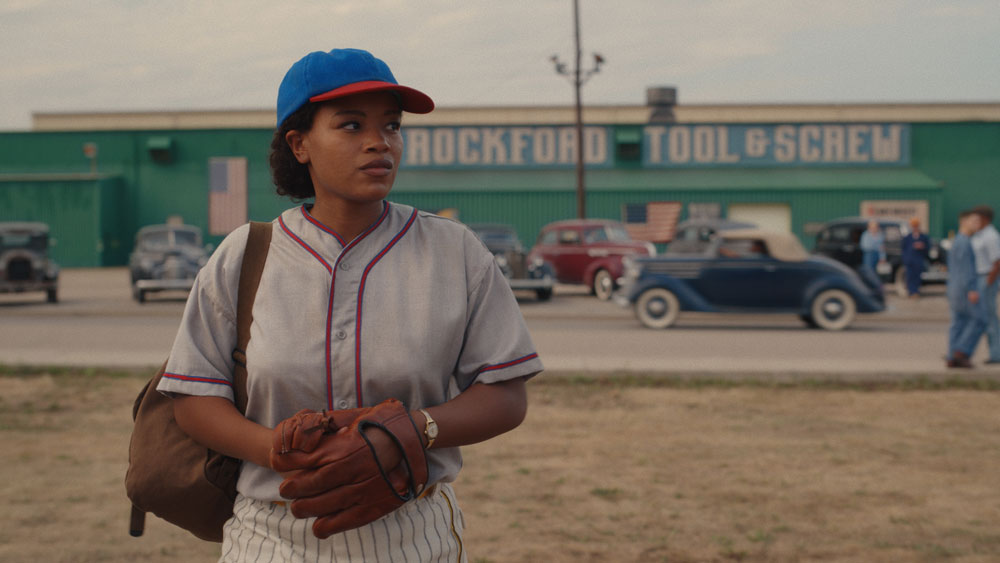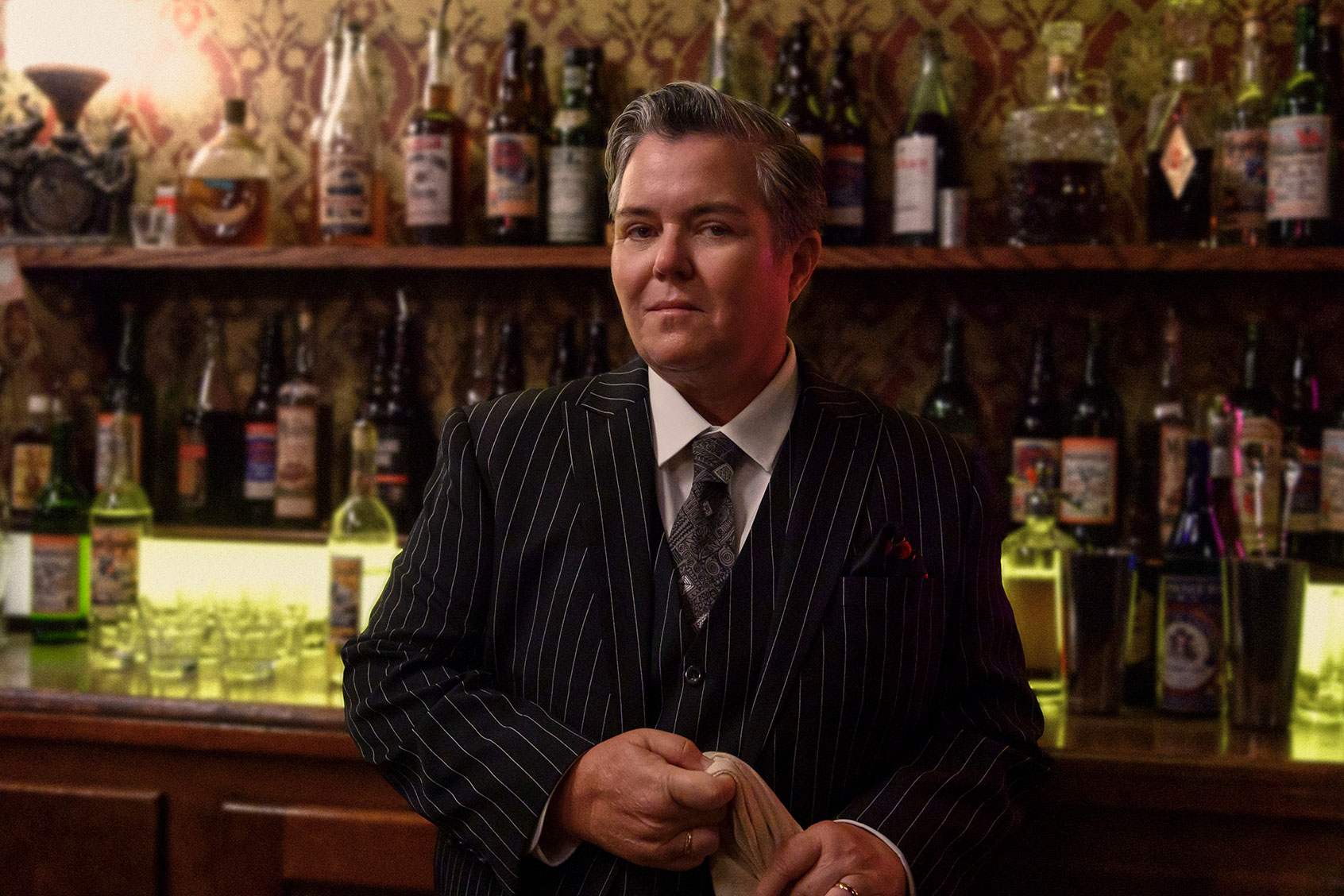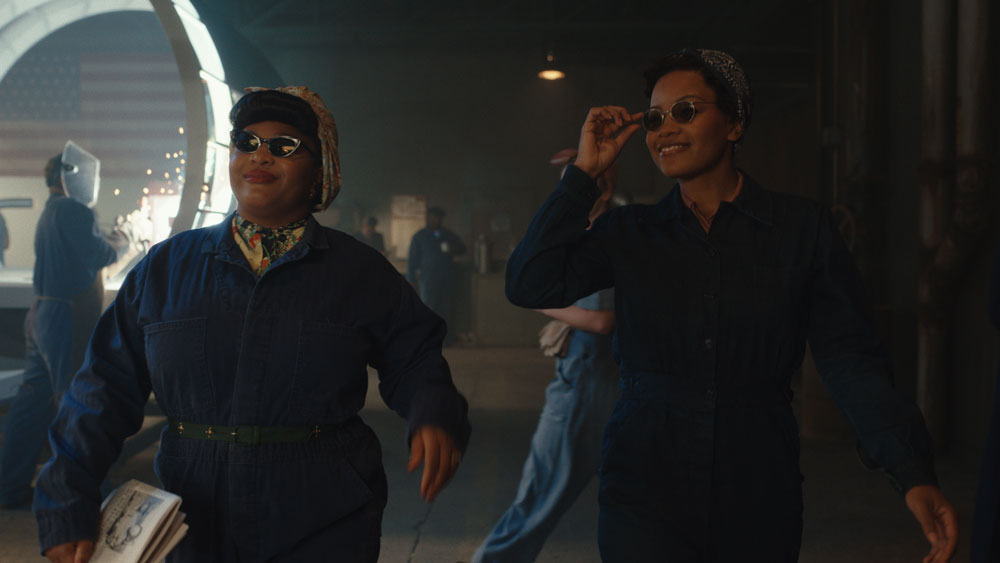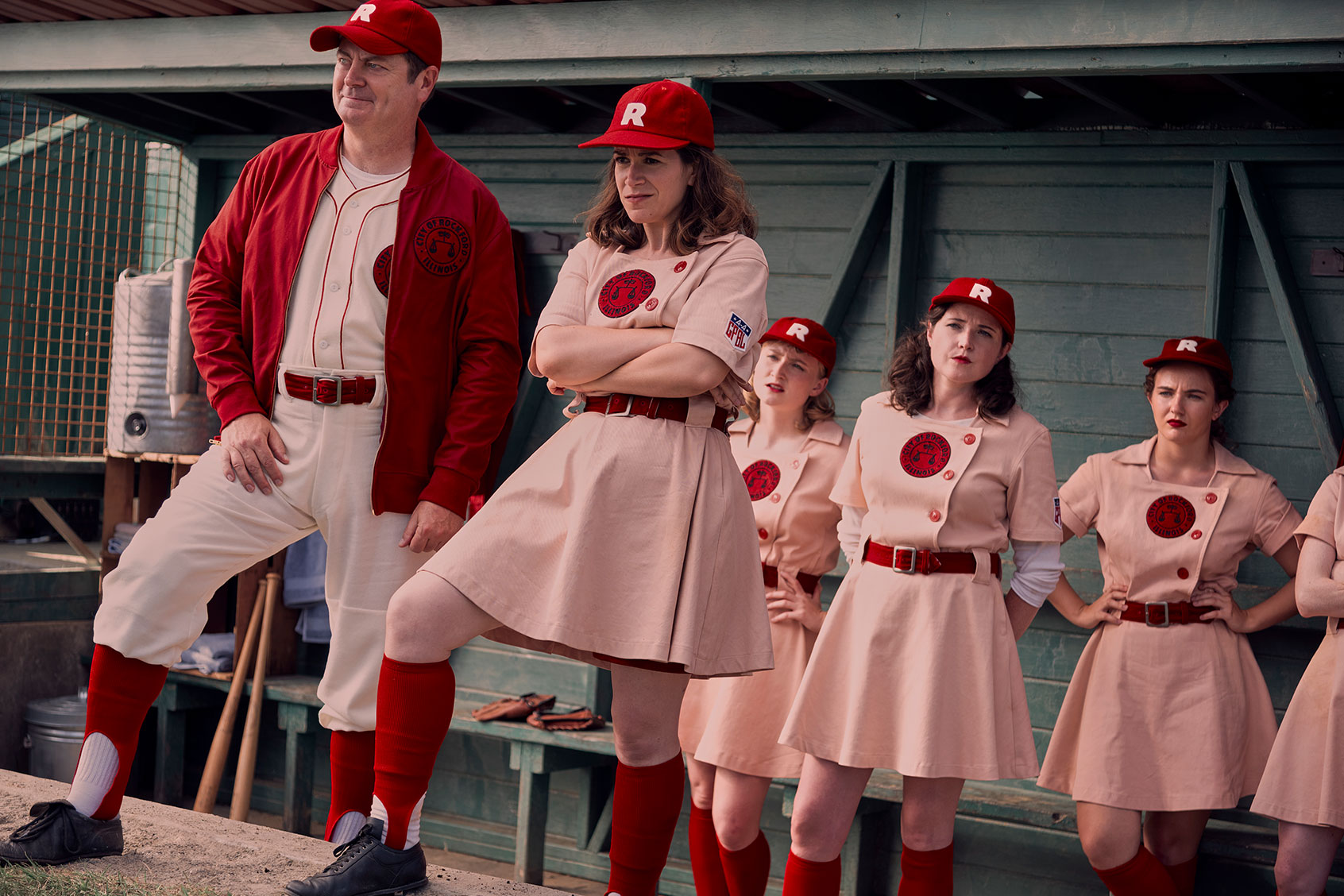Thirty years ago the inimitable Penny Marshall made her best effort to satisfy sticklers for historical accuracy and her desire to spotlight DeLisa Chinn-Tyler in “A League of Their Own.”
Chinn-Tyler’s name may not be known to most people, but Marshall designed the former competitive softball player’s part to leave a mark. Recently Chinn-Tyler told Consequence.net that she showed up at the movie’s casting call only to be told at the end of the day that there were no parts for Black actors on the Peaches, explaining that the teams were segregated in the 1940s.
But Marshall was so impressed by the ball player’s skill that she wrote a part for her anyway. Chinn-Tyler is the Black woman who returned an overthrown ball to Geena Davis’ Dottie Hinson with such accuracy and heat that catching it requires Dottie to pause and shake off the pain. Chinn-Tyler’s character responds with a proud nod of her head.
The whole exchange takes up around 15 seconds but stands out enough to inspire Abbi Jacobson and Will Graham to do what Marshall could not in 1992.
While Chinn-Tyler’s ballplayer was left unnamed and uncredited, the eight-episode adaptation of “A League of Their Own” devotes extensive screen time and deep character development to Chanté Adams’ Maxine, a Black woman living in the United States in 1943. While men of fighting age are drafted to fight in World War II, women are called to serve by entering the workforce, whether by taking jobs in factories or on the ball field.
Max, as she prefers to be called, can handle both kinds of work. But the men running the All-American Girls Professional Baseball League won’t even allow her an official tryout, and her mother presumes she’s going to take over her hair salon. One obstacle after another stands in Max’s way. On top of it all, Max is queer.
 A League of Their Own (Courtesy of Prime Video)
A League of Their Own (Courtesy of Prime Video)
You may be wondering what her storyline has to do with the one we know from “A League of Their Own,” centered on the Rockford Peaches. It’s a fair question that the first season doesn’t answer with utter satisfaction . . . if you are looking for the show to simply run the same narrative bases as the movie.
It does that to a point. The famous “There’s no crying in baseball” line? It’s in there. None of the characters from the movie appear in the show, although many of the new Peaches resemble women we’ve met before.
The most prominently featured characters crystallize the show’s focus on queerness and marginalized perspectives.
Carson, like Davis’ Dottie, is married and hails from a farming town,. D’Arcy Carden’s glamorous Greta is the show’s answer to Madonna’s All the Way Mae, a flirtatious, fame-seeking slugger flanked by her best friend Jo (Melanie Field). Together they march into the Chicago ballpark hosting the tryouts and earn spots on the Peaches’ lineup along with other talents, some of whom break out from the pack and others that are there to populate the dugout.
You may find a few likable traits in Nick Offerman’s washed-up major league player turned coach, Dove, although he’s considerably less sympathetic than Tom Hanks’ Jimmy Dugan.
Neither Hanks nor Davis makes a cameo, but Rosie O’Donnell has a part to play as the proprietor of a speakeasy that serves as a LGBTQIA sanctuary. Through all of these changes and many more, the writers reinterpret the title to encompass a feeling along with delivering a fictionalized account of a real women’s professional team.
 A League of Their Own (Anne Marie Fox/Prime Video)
A League of Their Own (Anne Marie Fox/Prime Video)
This makes room for Max’s story. It does not prevent it from existing separately from that of Jacobson’s lead character Carson and the other Peaches. Carson and Max cross paths in key moments and eventually spark a friendship, albeit in secret. However, Carson is part of the group of white and white-passing women drawn to Chicago from towns and cities across the United States for their shot at playing professional baseball.
But while Carson’s dramas mirror some of Dottie’s – which is to say, she mainly worries about how to deliver her team to victory and win the world’s respect – Max would consider it a win if she were to get any chance to play anywhere.
The most prominently featured characters crystallize the show’s focus of queerness and marginalized perspectives. Organizing the plot around that vision lends the opening season a profound sense of mission and heart, enabling us to know enough of the Peaches intimately enough to root for them on the field and off.
Plus it’s nearly impossible for anyone to deny Carden’s charisma here. If she was an attention-seizing spark in previous shows, she’s the gravitational pull holding her side of “A League of Their Own” together with verve and passion.
 A League of Their Own (Anne Marie Fox/Prime Video)
A League of Their Own (Anne Marie Fox/Prime Video)
That said, the story connects most effectively once the plot widens its lens beyond Carson and Greta’s tumultuous friendship beginnings, which is halting at first before picking up speed. Roberta Colindrez is a gift in any show that features her, so her pitcher, Lupe, benefits the most from this expanded focus.
Dubbed by the press as the team’s “Spanish Striker,” Lupe is caring and marvelously rough around the edges while also looking after the team’s youngest member Esti (Priscilla Delgado). Esti doesn’t speak English, which often means she’s left out of the team’s bonding sessions.
At least she’s allowed to play because she doesn’t look like an outsider to the folks in stands. Max, on the other hand, leads a separate existence despite having as much talent as any of the Peaches, if not more.
“A League of Their Own” isn’t one story built around a highly engaging main character but two plots running in parallel.
Max has her fan club in her best friend Clance (Gbemisola Ikumelo), a recently married comic book nerd whose husband loves his wife’s nerdiness. Ikumelo is the show’s other significant magnetic force, and her humor and spirit prevent Max’s storyline from being defined by setbacks and frustration. She makes Clance a welcome comic presence in a community that doesn’t easily accept women who don’t match the standard picture of a churchgoing wife or eager, self-sacrificing mother.
 A League of Their Own (Courtesy of Prime Video)
A League of Their Own (Courtesy of Prime Video)
At the same time, her performance also highlights one of the main errors in the show. “A League of Their Own” isn’t one story built around a highly engaging main character but two plots running in parallel, with one more extensively staffed with speaking roles than the other, and neither of whose leads are more compelling than the people around her.
None of this impedes the show’s ability to deliver on the joy and nostalgia that is the original film’s hallmark. Everyone making this series takes great care to cultivate that feel-good spirit, capturing enough of it to keep the audience hooked on the Peaches’ exploits through the most anxious stages of the season.
This approach cannot help but manifest as the imperfect solution to a conundrum of inclusion. Jacobson, Graham and the other writers ardently devote the story to representing voices and perspectives that were absent in Marshall’s movie while acknowledging the brutal truth of how dangerous that era was for queer and Black people.
Presenting Max’s and Carson’s storylines separately acknowledges the reality of segregation in Jim Crow America. But this also means Max doesn’t get to participate in the heights of each Peaches victory or the nail-biting worry of the team’s setbacks. The scripts create an engaging arc through which Max discovers where she belongs, but she’s never a fully enfranchised participant in their emotional highs and lows.
That also means her journey never completely shakes free of the nagging question of when and how Max will finally join Carson and the rest of the Peaches. That’s the side of the show pitching the joy of watching women triumph at a sport they and much of America loves.
Judging by how the first season plays out it’s tough to predict whether the producers will ever grant Max that shot. Still, their earnest effort to do right by her comes off well. Maxine is a wonderful tribute to the three women who played professional baseball in the American Negro Leagues: Mamie Johnson, Connie Morgan, and Toni Stone. And Adams is wonderful to watch, especially when she’s partnered with Ikumelo.
She’s also as made-up as Carson, Greta, Lupe, Jo, and every other character, which makes a person wonder how long a fictional journey like this is obligated to adhere to historical accuracy.
“A League of Their Own” steals home by presenting two shows under a single awning in Season 1. But if it manages to earn another season, hopefully its creators will take that as a signal that it’s OK to merge Max’s and Carson’s paths.
Want a daily wrap-up of all the news and commentary Salon has to offer? Subscribe to our morning newsletter, Crash Course.
Because while it’s wonderful to feature Black baseball players alongside the Peaches’ adventures in the AAGPBL, it could be even more rewarding for the show’s creators to realize, through Max, the dream that Black women who wanted to play professional ball were denied.
It’s true that women’s professional baseball teams weren’t integrated in 1943, and the color line in professional baseball wouldn’t be broken until Jackie Robinson got his shot in 1947. But most people didn’t fall for the first version of “A League of Their Own” for the history, much of which was and is underexposed anyway.
They loved it for the same traits the show capitalizes upon, which is the warmth, sisterhood, and friendship that endured decades after the women’s league shut down. Done well, that can feel as honest as anything recorded in the history books, even if it is a fantasy. Women like Max deserve to play a part in that vision too. Perhaps in another season, she will.
All episodes of “A League of Their Own”are streaming on Prime Video. Watch a trailer via YouTube.

